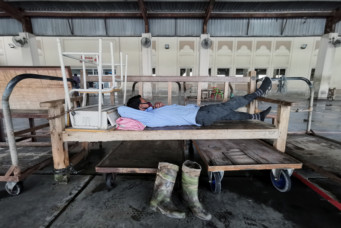“We want to see real results”
The Cairo Review speaks to Rothna Begum about the status of female migrant domestic workers in the Gulf.

Rothna Begum, New York, August 2013. Pierre Bairin/Human Rights Watch
Since 2008 Rothna Begum has been advocating for women’s rights in the Middle East and North Africa region, first with Amnesty International then with Human Rights Watch (HRW). Having studied Islamic as well as human rights and international law, her interest in the topic drew her to work in Saudi Arabia and other Gulf countries where sharia is either the law or the source of the law. Given the huge population of female domestic workers coming from Asian countries to the Gulf and their vulnerability to different types of abuse, this soon became Begum’s main area of focus. On April 16, Begum spoke to the Cairo Review about the state of migrant domestic workers in the region and efforts to protect their rights.
CAIRO REVIEW: Have you seen progress since you first came into this field ten years ago?
ROTHNA BEGUM: When I started there was a serious deficit in protection for workers. Migrant domestic workers face the triple forms of discrimination: one, they are women; two, they are migrants; three, they are specifically domestic workers. In the Gulf countries, domestic workers were long excluded from labor laws. As women, they’re more vulnerable to sexual abuse, and also trapped in the homes as domestic workers so they are really liable to both physical and very intimate forms of abuse unlike other migrant workers. And, of course, specific racial discrimination comes into that.
In the Gulf, we have seen a series of reforms recognizing the rights of domestic workers, starting with Jordan in 2008, Bahrain in 2012, Saudi Arabia in 2013, Kuwait, which had the most progressive law in the Gulf region in 2015, and Qatar and the UAE in 2017. The last Gulf Cooperation Council country is Oman, which has a 2004 regulation of domestic workers but has no penalties so it’s not effectively any form of labor law.
But the other big problem is the kafala system. The idea that your entire legal status is based on your employer’s permission gives a huge amount of control to the employers to become as abusive or exploitative as they like. However, HRW has helped play a part in developing the global treaty on domestic workers’ rights, the Convention on Domestic Workers adopted at the International Labour Organization, which was passed in 2011. And because of the work of HRW and other organizations we have seen some changes. The UAE, Saudi Arabia, and Qatar have amended some aspects of the kafala system.
The biggest potential change is Qatar, which has committed with the ILO to other reforms, including reforming the kafala system by moving toward a government issued visa for migrant workers. If Qatar actually does reform the kafala system, potentially this could lead the rest of the Gulf region into a different situation entirely.
CAIRO REVIEW: How much are recruitment agencies involved with legal, semi-legal, and illegal recruitment of workers? To what degree are authorities involved?
ROTHNA BEGUM: To start off, in the last two to three years we’ve seen a huge surge in recruitment from African countries, including domestic workers, because Asian countries have stepped up protection for their workers, and also placed bans on their workers coming into the Gulf region due to abuses. The problem is that the Asian countries have had to build up laws and recruitment policies, and figure out protection mechanisms at their embassies to help manage this recruitment and protect their workers. Now, it’s not perfect, but they are decades ahead of countries in Africa.
In terms of illegal versus legal recruitment, for Middle Eastern countries, if you have a visa to come into the country, and then an employer secures you a work permit, it’s perfectly legal. That doesn’t mean you didn’t come in as a trafficked victim. You could have been promised by an agent from your country of origin a certain wage or certain conditions, turn up at the country, and find yourself basically trafficked into forced labor conditions. The system recognizes you as a legal worker, but you’re still a trafficking victim.
On the country of origin side there are recruitment agencies, some of which are registered with the government, but there’s no proper oversight to check whether a worker is going with a registered or unregistered agent. I spoke to registered recruitment agents from agencies that are credited with the government who were committing what you would consider to be classic trafficking or forced labor violations, which they sent to me themselves, because they didn’t see it as bad practice. One agent, for instance, was forcing women to sign a document saying that they would not return early from their contract including under circumstances where they would have fallen pregnant, or had a relationship with their employer, or they could be fined $2,000.
CAIRO REVIEW: Do you really think that these agents don’t realize their actions border on slavery, or at least, forced labor?
ROTHNA BEGUM: Well this agent told me how he prevents workers from leaving their contracts early as a normal protection measure for himself. And he knows that I’m speaking to the government. I think if he knew it was bad practice he wouldn’t be admitting that to me.
The issue is not with this agent particularly, but with the policies and laws and the government. These policies are so bad and have so little to do with the recruitment agencies, that the agent is not actually committing anything illegal. I think there’s a deficit in the understanding of some of these governments about how to protect these workers. Some of these governments are too busy focusing on how they can send their workers over to other neighboring countries. Some government officials and members of parliament may be benefitting from the recruitment, so there’s a whole other issue of public officials who are invested in these recruitment agencies, who realize this is a business venture, and are part of these ventures now. One way to resolve that is to have laws that say that government officials cannot be investing or partnering with these agencies.
CAIRO REVIEW: You mentioned Kuwait as one of the best countries for some kind of legal representation. Why do you think that is?
ROTHNA BEGUM: Kuwait in 2015 was the most progressive in the Gulf region, but that doesn’t mean that’s the case anymore, because the UAE and Qatar have established laws since 2015 which are similar and have their own standards so they vary in their quality. So Kuwait provides overtime compensation which the other two don’t. The UAE provides workplace inspections, which Kuwait has not established when it comes to the homes themselves. So on different points they’re stronger, and weaker on others. The problem is that the abuses have continued in Kuwait because of an inability to properly recognize their rights under the kafala system. So as a worker, even though you now have some rights under the law, how do you claim those rights if you are still tied to your employer?
CAIRO REVIEW: Do you think such a patriarchal, dominant system as the kafala system could ever realistically be reformed?
ROTHNA BEGUM: I think we’re seeing the beginning of it. I think that because of their commitment to the ILO, Qatar will be the first example of seeing whether or not they will actually amend the system.
CAIRO REVIEW: But still maintain the idea that you’re tied to your employer?
ROTHNA BEGUM: Well, Qatar has committed to reforming the kafala system and their commitments have to come through in a way that means they can’t be still trafficking workers into false labor situations. And currently the kafala system is an exploitative environment that allows forced labor situations because of the way it is designed. It traps you with that sponsor. They have to do away with this.
CAIRO REVIEW: How do you feel about the future of migrants in the Gulf?
ROTHNA BEGUM: I have mixed feelings. We have seen some changes in the Gulf region that wouldn’t have happened if there wasn’t a level of commitment and passion and hard work by many organizations and advocates. But the abuses still continue. We want to make sure that those changes are strong, that they come much faster. Gulf countries are succeeding largely on the backs of these workers that have come in the millions; they should not be allowed to get away with the kinds of abuses they have been.
So I don’t want to accept the small achievements as a consolation prize, for the work that has been done. We want to see real results; we want to really see such a cultural change because there’s been a serious commitment by these governments.
But that won’t happen unless there is a serious commitment from countries of origin to their citizen populations and from the international community to say they won’t tolerate this situation where the entire system is designed to have an an easily exploited labor force.
Subscribe to Our Newsletter




